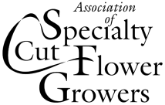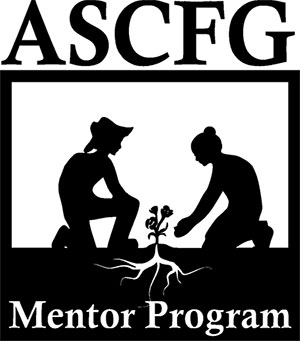ASCFG Mentor Program
Giving Back to the Cut Flower Industry
The ASCFG Mentor Program is designed to fast track younger or inexperienced growers through the learning phase of beginning flower farming. The program pairs beginning farmers—those completely new to cut flowers, or perhaps vegetable or agronomic farmers expanding their crops—with experienced cut flower growers. Mentors and Mentees will communicate frequently (the means and frequency of communication are mutually decided); visit each other’s farms if possible; and attend ASCFG online and in-person events when scheduled.
This program helps ensure a more successful venture for our mentees and result in high quality growers. We want to facilitate the professional growth of cut flower farmers, which further enhances the industry and the Association of Specialty Cut Flower Growers. Qualified beginning farmers must be ASCFG members to participate. Regardless of experience, all growers benefit from personal interaction with each other. The mutual commitment for learning and networking extends for years beyond the mentor cycle, and strengthens bonds throughout the ASCFG.
Eligibility Requirements for Mentors
We ask that prospective Mentors have eight or more years of cut flower farming experience in combination with a track record of successful sales to one or more markets (for example, wholesale, farmers’ markets, florists, etc.).
What’s Involved?
During the yearlong mentorship, we ask ASCFG Mentors to engage in the following activities.
- Co-develop a learning plan of discussion topics for the forthcoming year with Mentee(s).
- Determine and agree upon communication mode (phone, text, Zoom, and/or email) and frequency.
- Host your Mentee(s) at your farm at least once.
- Visit your Mentee’s farm at least once.
- Participate in quarterly virtual check-ins with other Mentors and the ASCFG Education Director.
- Communicate with the ASCFG Education Director periodically throughout the year via emails, phone, or by responding to written surveys.
- Complete an annual evaluation about the program and your Mentee at the end of the year, as well as a final report for publication in The Cut Flower Quarterly. Alternatively, you may be asked to participate in a webinar to discuss your experiences.
Benefits of Participation
- One-year comped ASCFG membership.
- $100 stipend for the year.
- Travel reimbursement up to $300 after receipts are received for on-farm site visits.
Your knowledge and experience as a longtime cut flower grower are invaluable. If you’re ready to share some of that expertise with a new grower, please consider becoming an ASCFG Mentor. It’s likely that you’ve already mentored farmers informally; join the ASCFG Mentor Program to help ensure the health and future of the local flower industry. Apply for the 2024 mentorship period by September 1, 2023!
What’s Involved?
● Co-develop a learning plan of discussion topics for the forthcoming year with your mentor.
● Determine and agree upon mode (phone, text, Zoom, and/or email) of communication and frequency.
● Host your Mentor at your farm at least once.
● Participate in quarterly virtual check-ins with other Mentees and the ASCFG Education Director.
● Communicate with the ASCFG program coordinator periodically throughout the year via emails, phone, or by responding to written surveys.
● Complete an annual evaluation about the program and your Mentor at the end of the year, as well as a final report for publication in The Cut Flower Quarterly.
Mentee Benefits
- One year complimentary ASCFG membership.
Please note that starting in 2024, mentees accepted in the ASCFG Mentor Program will pay a single, one-time fee of $250. This fee is used to ensure that the Mentor Program is self-sustaining and can continue to flourish.

